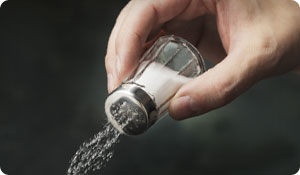
A 2011 study published in the Journal of the American Medical Association questions the body of evidence showing that a low-salt diet decreases the risk of heart disease.
The observational study included 3,681 middle-aged Europeans who did not have high blood pressure or cardiovascular disease at the start of the study. The participants were followed for an average of 7.9 years. The researchers assessed the volunteers' sodium consumption when they entered the study and at its conclusion by measuring the amount of sodium excreted in urine over a 24-hour period and found that the less salt the participants consumed, the more likely they were to die of heart disease. And while those eating the most salt had a slight increase in systolic (top number) blood pressure, they didn't have a higher risk of developing hypertension (high blood pressure).
But don't start filling up your salt shaker just yet. Critics of the study say it was flawed. For one thing, say experts, the study was too small and its participants too young-on average age 40 at the start-and that with few cardiovascular events, it's difficult to draw hard conclusions. Also, the study participants were mostly white and high blood pressure tends to affect African-Americans disproportionately.
Although the study investigators didn't provide an answer as to why lower sodium intakes might raise a person's heart risk, Jan Staessen, MD, PHD, professor of medicine at the University of Leuven in Belgium and one of the study's authors, said in the news@JAMA blog that while he can't be sure of the underlying mechanism, it's possible that decreasing sodium intake by a lot activates "some of the systems that conserve sodium and they are known to have a negative influence on cardiovascular outcomes. This may be an underlying mechanism."
Based on many scientific studies showing a strong relationship between reduced salt consumption and a lower risk of heart attacks, congestive heart failure and stroke, the American Heart Association (AHA) recommends that Americans consume no more than 1,500 milligrams (1/2 teaspoon) of sodium a day-less than half of what people consume now. Approximately 90 percent of all Americans, says the AHA, will develop hypertension over their lifetime.
If you have high blood pressure or you're concerned about developing it, talk to your doctor about the best course of action for you. Making some lifestyle changes can also help, including:
- Quitting smoking
- Maintaining a health weight
- Getting regular exercise
- Eating a healthy diet high in fruits and vegetables and low in fat
Sources:
JAMA. "Fatal and Nonfatal Outcomes, Incidence of Hypertension, and Blood Pressure Changes in Relation to Urinary Sodium Excretion." Web.
http://jama.ama-assn.org/content/305/17/1777.short
Wall Street Journal. "New Study Questions Whether We Should All Be Ducking Salt."
http://blogs.wsj.com/health/2011/05/04/new-study-questions-whether-we-should-all-be-ducking-salt/





